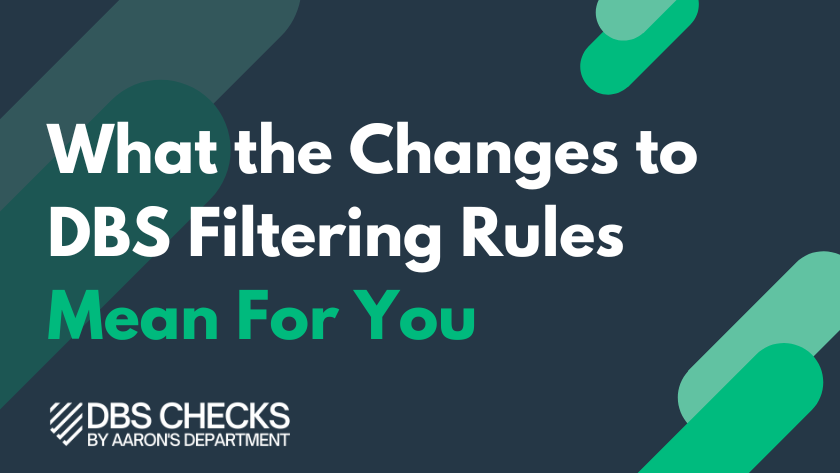Introduction: What the Changes to DBS Filtering Rules Mean For You
At Aaron’s Department, we are dedicated to providing you with reliable, transparent, and efficient services. We understand that staying up to date with changes in regulations is vital.
As of October 28, 2023, the UK government has introduced important changes to DBS filtering rules for Disclosure and Barring Service (DBS) certificates. These changes are aimed at striking a balance between safeguarding and providing opportunities for individuals with past convictions. In this article, we will focus on these new rules and their implications.


Key Changes To DBS Filtering Rules – Effective from October 28, 2023
The forthcoming changes to DBS filtering rules for DBS certificates are designed to balance the protection of vulnerable individuals with providing opportunities for those with historical convictions. Let’s have a closer look at how these changes may affect you:
- Reduced Disclosure Periods: One of the most significant changes is the introduction of reduced disclosure periods for certain offences. This means that some convictions and cautions will no longer be disclosed on DBS certificates after a specific period. The duration of these periods depends on the nature of the offence and the age of the individual at the time of the conviction.
- Enhanced Protection for Young Offenders: The updated filtering rules extend the protection for young offenders by increasing the filtering periods. This ensures that many offences committed by individuals under the age of 18 will not be visible on their DBS certificates. As a result, you will encounter fewer convictions committed while under 18 on DBS certificates.
- Multiple Convictions Rule – Removed: This rule meant that anybody with multiple convictions had all of them disclosed on their DBS checks, regardless of the filtering of convictions rules. This rule has been removed, so every offence is considered on its own without being influenced by other offences.
- Specialised Filtering for Sexual Offences: Specific sexual offences will be subject to unique filtering criteria, offering increased protection for vulnerable individuals and maintaining appropriate safeguards.


What These Changes To DBS Filtering Rules Could Mean for You
The changes, effective from October 28, 2023, have been introduced by the Government to ensuring a fair and transparent recruitment process, and they offer several benefits to people
1. Continued Safeguarding: These changes prioritise safeguarding while ensuring individuals with serious convictions are identified and monitored.
2. Enhanced Opportunities: The updated rules provide individuals with past convictions more opportunities to reintegrate into the workforce, which benefits employers and society as a whole.
Government Guidelines And Advice For Employers
The government’s New filtering rules for DBS certificates (from 28 October 2023 onwards) includes the information below:
Updating Your Recruitment Application Forms For Changes To DBS Filtering Rules
Job application forms relating to positions that are eligible for a Standard or Enhanced DBS check will need to reflect the filtering rules so that:
- employers ask the right questions, and
- employees give the right (legally accurate) answer
We suggest that you use the following questions as a template for your own recruitment processes:
Do you have any unspent conditional cautions or convictions under the Rehabilitation of Offenders Act 1974? (Y/N)?
Do you have any adult cautions (simple or conditional) or spent convictions that are not protected as defined by the Rehabilitation of Offenders Act 1974 (Exceptions) Order 1975 (Amendment) (England and Wales) Order 2020? (Y/N)?
You are also encouraged to include the paragraphs below in your standard application forms:
The amendments to the Rehabilitation of Offenders Act 1974 (Exceptions) Order 1975 (2013 and 2020) provides that when applying for certain jobs and activities, certain convictions and cautions are considered ‘protected’. This means that they do not need to be disclosed to employers, and if they are disclosed, employers cannot take them into account.


Conclusion – What the Changes to DBS Filtering Rules Mean For You
In conclusion, the recent changes to DBS filtering rules, effective from October 28, 2023, mark a significant step towards achieving a balance between safeguarding and providing opportunities for individuals with historical convictions.
By introducing reduced disclosure periods, enhancing protection for young offenders, implementing the multiple convictions rule, and introducing specialised filtering for sexual offences, these adjustments promote continued safeguarding while also expanding opportunities for those with past convictions to reintegrate into the workforce.
Forward someone this article!
Related Content
If you found this article on changes to DBS Filtering Rules useful, you may also want to read our informative articles below
- Do DBS checks show pending convictions?
- What is the Barred List?
- What are Specified Places?
- Can My DBS Check Get Me Fired?
About The Author


Kellie Dawson
Kellie is our in-house legal expert when it comes to DBS checks. With a background in the legal sector, she has become a recognised authority in this area.
